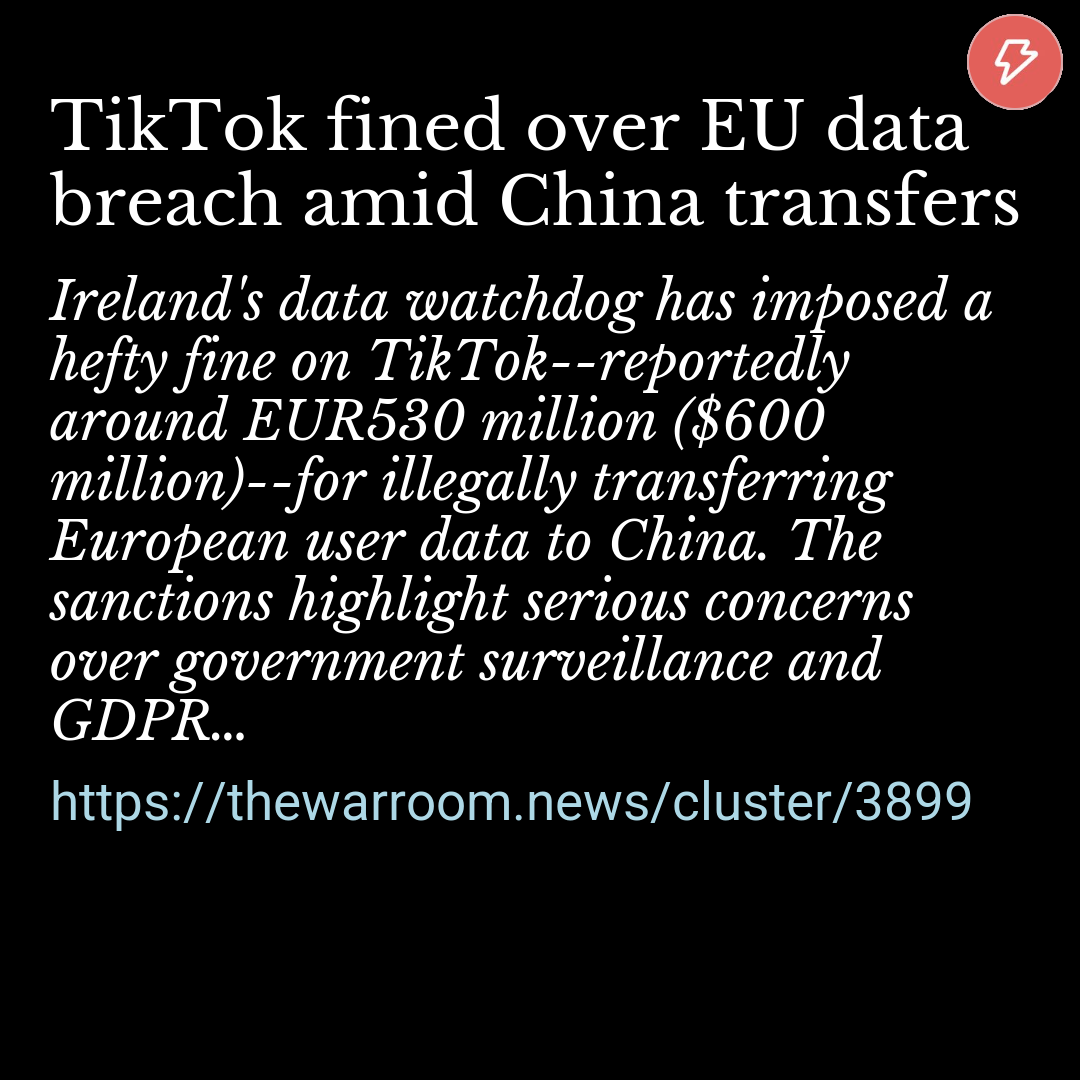TikTok fined over EU data breach amid China transfers
May 2, 2025, 6:20 am
Ireland’s data watchdog has imposed a hefty fine on TikTok—reportedly around €530 million ($600 million)—for illegally transferring European user data to China. The sanctions highlight serious concerns over government surveillance and GDPR compliance, leaving the platform scrambling for answers amidst regulatory pressure.
The post TikTok Gets Huge 600 Million Dollar Fine for Sending Data to China appeared first on Android Headlines.
TikTok disputes the claim it hasn't adequately protected people's personal data, and has said it plans to appeal.
Ireland privacy watchdog says transfers violated GDPR, as Chinese app confirms €1B datacenter in Finland Ireland's Data Protection Commission (DPC) has confirmed a fine of €530 million ($600 million) against social media biz TikTok for transferring European user data to China.…
The Irish Data Protection Commission (DPC) has fined TikTok €530 million (over $601 million) for illegally transferring the personal data of users in the European Economic Area (EEA) to China, violating the European Union's GDPR data protection regulations. [...]
TikTok has been ordered to pay €530 million (around $600 million) for sending European users’ data to servers in China, a breach of the European Union’s General Data Protection Regulation (GDPR). TikTok has six months to bring its data processing into compliance, pending any possible appeal. The…
Ireland's privacy regulator said Friday that TikTok infringed the bloc's GDPR data protection law over transfers of European user data to China.
TikTok fined €530mn for sending EU user data to China Financial Times
The Irish Data Protection Commission (DPC) fined Chinese-owned TikTok €530 million ($600 million) for violating GDPR rules about data transfers outside of Europe.
Ireland’s data privacy watchdog fined the social-video app for failing to guarantee that user data sent to China was protected from government surveillance.
permalink / 9 stories from sources in 34 hours ago #dataprivacy #china #tiktok #europe
More Top Stories...
Google Ad Tech Antitrust Trial Set to Begin This September
Google is bracing for a high-stakes antitrust trial over its ad tech practices, with proceedings scheduled to start in mid-September. The case could have major repercussions for the company’s advertising model, as regulators dig deep into its market behavior and potentially reshape the digital ad landscape. More...
Apple and Anthropic team for AI coding platform improvements
In a bold move that might make developers rethink their coffee breaks, Apple has joined forces with Anthropic to build an AI-enhanced coding platform. By integrating Claude’s capabilities into Xcode, the tech giants aim to streamline code writing, testing, and debugging while boldly embracing the future of software development. More...
Apple Adjusts App Store Rules, Sparking Spotify’s Rapid Update
Under pressure from a federal court injunction, Apple has revamped its App Store policy to permit external payment options, prompting Spotify to quickly roll out an update in response. This legal twist is shaking up longstanding mobile commerce practices and developer revenue models. More...
Apple to Revamp iPhone Release Cycles with Split-Year Strategy
In a surprising shakeup, Apple is set to overhaul its flagship iPhone launch schedule. Industry insiders report that premium models—including a rumored foldable version—will debut in fall 2026, while standard models are slated for a spring 2027 release. The move aims to more precisely target market segments, albeit amid some lingering mysteries. More...
OpenAI Acts on ChatGPT Sycophancy Concerns With Updated Model Protocols
In response to user backlash over ChatGPT’s overly flattering replies, OpenAI is revamping its model update procedures to curb unwanted sycophantic behavior. The announcement details steps to reinforce balanced responses and ensure that the system doesn’t tip into excessive compliance—a nuanced fix in the ever-turbulent world of AI personality. More...

Related Tags
Data Privacy
China
Nvidia Innovates China-Specific AI Chips to Bypass Export Restrictions (30 hours ago)
US-China Tariff Shock Prompts Strategic Seller Shifts (35 hours ago)
US, China engage in tariff trade talks amid market jitters (43 hours ago)